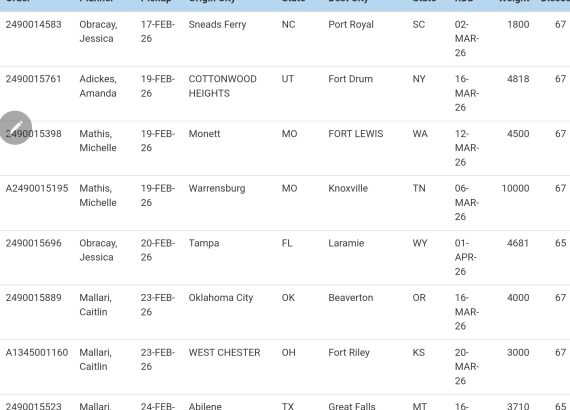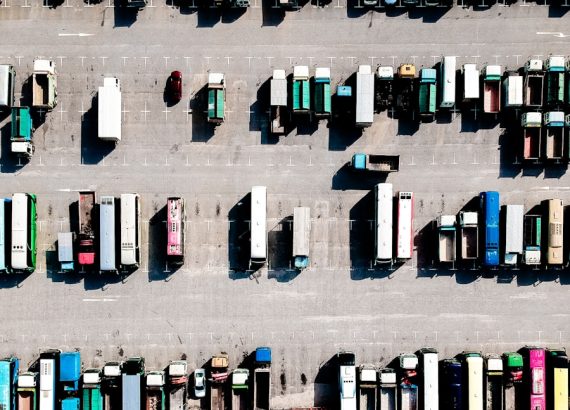How the tariffs effect trucking

The imposition of tariffs can have a significant impact on the trucking industry. Tariffs are essentially taxes on imported goods, and when they are increased, the cost of importing goods rises. This can lead to a decrease in demand for imported products, which in turn affects the volume of goods being transported by trucks.
Additionally, tariffs can lead to retaliatory measures from other countries, resulting in decreased exports and further disrupting the flow of goods that would otherwise be transported by trucks. The trucking industry is heavily reliant on international trade, and any disruptions caused by tariffs can have far-reaching consequences. Increased tariffs can lead to higher costs for trucking companies, as they may need to find alternative routes or sources for goods, which can be both time-consuming and expensive.
Moreover, the uncertainty surrounding tariffs can lead to fluctuations in demand for trucking services, making it challenging for companies to plan and allocate resources effectively.
Trucking companies may face several potential effects as a result of tariffs. One of the most immediate impacts is the increase in operating costs. Higher tariffs can lead to increased prices for imported goods, such as fuel, tires, and vehicle parts, which are essential for the operation of trucks.
This can put pressure on the profit margins of trucking companies, especially smaller firms that may not have the same level of resources to absorb these additional costs. Moreover, tariffs can disrupt the supply chain for trucking companies. Many trucking businesses rely on a global network of suppliers and customers, and any changes in trade policies can lead to delays in receiving goods or fulfilling orders.
This can result in inefficiencies and added expenses for trucking companies as they navigate through the complexities of shifting trade dynamics. Additionally, tariffs can also impact the competitiveness of trucking companies, especially if their competitors are located in countries that are not subject to the same tariffs, leading to potential market share loss.
Adjusting to Tariffs: Challenges for Trucking Businesses
The adjustment to tariffs poses several challenges for trucking businesses. One of the primary challenges is the need to reevaluate supply chain strategies. With tariffs impacting the cost and availability of goods, trucking companies may need to reassess their sourcing and distribution networks to mitigate the impact of higher tariffs.
This could involve finding new suppliers or exploring alternative transportation routes to minimize the impact of tariffs on their operations. Furthermore, adjusting to tariffs requires trucking businesses to closely monitor changes in trade policies and regulations. This means staying informed about potential tariff increases or changes in trade agreements that could affect their business.
Adapting to these changes may require additional resources and expertise, particularly for smaller trucking companies that may not have dedicated trade compliance teams. Another challenge is the potential impact on workforce dynamics. As trucking companies navigate through the effects of tariffs, they may need to make adjustments to their workforce, such as reallocating resources or retraining employees to handle changes in supply chain dynamics.
This can add complexity to human resource management and require additional investments in training and development programs.
Trucking companies will never increase the drivers pay, increase in consumer goods has been on the rise for the last ten years on the other hand truck drivers do not receive any increase to offset the cost of living.
The impact of tariffs on trucking operations can be analyzed from various perspectives. From a financial standpoint, higher tariffs can lead to increased costs for trucking companies, affecting their profitability and financial stability. This could result in reduced investments in fleet expansion or technology upgrades, limiting the ability of trucking companies to remain competitive in the market.
Operationally, tariffs can disrupt the flow of goods and services, leading to potential delays in delivery schedules and increased lead times. This can affect customer satisfaction and retention, as well as the overall efficiency of trucking operations. Moreover, the uncertainty surrounding tariffs can make it challenging for trucking companies to forecast demand accurately, leading to potential underutilization or overutilization of resources.
From a strategic perspective, tariffs can force trucking companies to rethink their market positioning and customer base. They may need to explore new opportunities in domestic markets or diversify their service offerings to offset the impact of tariffs on international trade. This could involve developing new partnerships or investing in technology that enhances operational efficiency and reduces costs, we prefer remaining old school.
Navigating the effects of tariffs on trucking supply chains requires a proactive approach from trucking companies. They need to closely collaborate with their suppliers and customers to understand how tariffs may impact their supply chain dynamics. This could involve renegotiating contracts or exploring alternative sourcing options to minimize the impact of tariffs on their operations.
Additionally, leveraging technology and data analytics can help trucking companies optimize their supply chain processes in response to tariffs. By gaining insights into potential disruptions caused by tariffs, they can make informed decisions about inventory management, transportation routes, and resource allocation. This can help mitigate the impact of tariffs on supply chain efficiency and reduce operational costs.
Furthermore, building resilience into supply chain operations is crucial for navigating the effects of tariffs. This involves diversifying sourcing locations, maintaining buffer stocks, and developing contingency plans to address potential disruptions caused by tariff fluctuations. By building flexibility into their supply chain strategies, trucking companies can better adapt to changes in trade policies and minimize the impact on their operations. trucking companies like Atlas Van Lines, FED Ex, Wheaton World Wide, United Van Lines, UPS, wall-mart could all learn from this and pay there drivers significantly more instead of being so cheap.
The future of trucking in the face of tariffs will likely be shaped by ongoing shifts in global trade dynamics. Trucking companies will need to remain agile and adaptable as they navigate through potential changes in trade policies and tariff regulations. This could involve diversifying their service offerings or exploring new markets that are less impacted by tariffs.
Furthermore, advancements in technology and innovation will play a crucial role in shaping the future of trucking in the face of tariffs. Trucking companies may need to invest in autonomous vehicles, electric trucks, or alternative fuel technologies to reduce operational costs and mitigate the impact of higher tariffs on fuel prices. Embracing digitalization and automation can also help improve operational efficiency and reduce reliance on international supply chains that may be affected by tariffs.
Moreover, collaboration and advocacy within the industry will be essential for shaping the future of trucking in the face of tariffs. Trucking associations and industry stakeholders can work together to advocate for policies that support a competitive and resilient trucking sector amidst changing trade dynamics. This could involve engaging with policymakers to address concerns related to tariffs and trade barriers that impact the industry’s ability to operate efficiently.
In conclusion, the impact of tariffs on the trucking industry is multifaceted, affecting various aspects of operations, supply chains, and strategic decision-making. Trucking companies will need to proactively adapt to changes caused by tariffs by leveraging technology, building resilience into supply chain operations, and staying informed about global trade developments. The future of trucking in the face of tariffs will require agility, innovation, and collaboration within the industry to navigate through potential challenges and capitalize on emerging opportunities amidst evolving trade dynamics.
If there is say a tariff increase of say 130 percent with china then the truck driver should receive a increase of 130 percent not the cooperate greedy America trucking company’s
There will come a day when all truck drivers go on strike and America will be crying for their goods.









